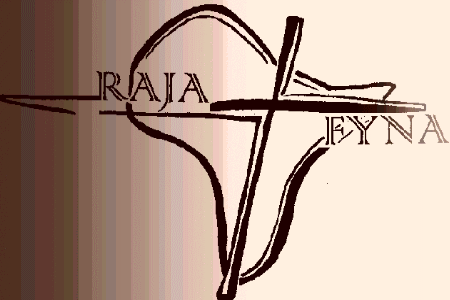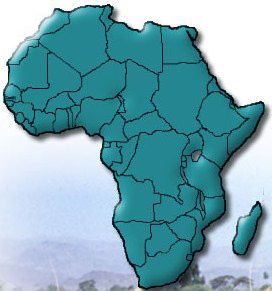3. The RAJA network
Let’s have a look now at the Network of former International Young Catholic Students.
The beginnings.
In December 1990, , Georgette Ngabolo at the head of the Gabonese International Young Catholic Students association between 1987 and 1989, and at that time student in the city of Nancy (France), had the idea to create « a friendly association of former Young african Catholic students”. This friendly association was constituted with all responsible members who were involved in the Panafrican counsel that took place end of the year 1985, beginning of the year 1986” in NAIROBI. Their main concerns were: « Do the participants to this counsel remain in contact with the African International Young Catholic Students’ organization? Do they still serve the movement?? She introduces the idea to the panafrican team who acknowleges the idea positively and asks her to extend the network to the all african catholic students member The idea was to follow through. To keep in touch and remain at the service of the movement that has shaped our mind was one of the goals of the emerging network but also “keep focusing and living our YCS’ (Young Catholic Sudents) ideal in our professional and personal current life.
 In august 1997, around sixty of us gathered in Bingerville (Ivory Coast) for the 1st general
assembly of our network. The participants came from a dozen of African countries. In her opening speech, Georgette had the following words: « To take out the words from Marthin Luther King,
I would like to say that the former young African students will gather within a unique, living and creative structure.
In august 1997, around sixty of us gathered in Bingerville (Ivory Coast) for the 1st general
assembly of our network. The participants came from a dozen of African countries. In her opening speech, Georgette had the following words: « To take out the words from Marthin Luther King,
I would like to say that the former young African students will gather within a unique, living and creative structure.
Bingerville, 1997
I had a dream that this structure would be a panafrican structure. I had a dream that this structure would allow the former African students to analyze the numerous challenges that their continent has to face, that it would help them bring their own contribution to the development of an African continent with more peace and more justice.
Finally, I also had a dream that they will find within this structure a place to enrich their faith, responding better to the demands of a Christ poor and liberator of the Poor . . If my oniric life has been moved by this desire, I can now think with full satisfaction and conviction that gathering here in Ivory Coast and precisely in Bingerville, is not an oniric living, but reality.,
In August 2009, a new gathering took place in Bingerville for the 5th general Assembly of the Network. Around 30 participants from six African countries have thought on a various range of subjects: Conflicts’ prevention; fight against Aids, good governance, Job and private entrepreneurship, civil society and link between YCS and RAJA etc..
From JEC to RAJA
The shift was not an easy. As young Catholic students, the “jecists” were part of a existing stable and structured organizations (within parishes, schools, local national or international teams etc) Create a network was something new. Most of the readers of this article are members of a network and we all know that a network for the Catholic Church is something new!) The easiest way is to reproduce what we already know. However the members of the RAJA are no longer students attending high schools or universities. The difficulties that they face in their professional and personal lives are no longer those of students.
Undergoing a “life revision” with “Jecists” from your own schools or universities and having to face the challenges common to several African countries living in Burkina Faso, Togo, Ivory Coast, Chad, and Cameroon is another kind of challenge that can turn to be complicated.
One of the main difficult points is that not all the members have access to the internet and a large part of the 300 members of the network with a valid email address do not have daily access.
To summarize, there are many obstacles. But since 1997, the RAJA network is a living network and continues to develop.
Gradually, the actions performed by the network have turned real and the calendar « Let’s talk about Aids » illustrates this. (See below)
Mgr Portela of Congo Brazzaville has sent his thanks to those Christians who do not forget their ideal when they hold important civil charges.

RAJA and Civil Society
A new question arises today.
This question was also raised in Binegerville, during our last RAJA meeting in august 2009, « which relationship can we set up between our international network and civil society? In the action plan set up during this assembly, we can read: The RAJA in CIVIL SOCIETY/ Take the initiatives of establishing contacts with other organizations of civil society. And we have seen previously that in Ivory Coast, Patrick Ngouan , former Jecist is now national coordinator of the civil society movement in Ivory coast.
In an interview, he explains clearly that to go through the crisis, we have to gather together (JEC and RAJA) can help build a strong civil society that includes the whole active Forces of the African society to help our African countries go through the different crises they are faced with. The necessity of working not only as a network of former African jecists but also with the country Active Forces is a new focus.
-----------------------
If you want to have more information on the Network of former African Jecists (RAJA), please have a look on google and type « Réseau des Anciens Jécistes d’Afrique » and you will be happy to find a lot of information.
-----------------------------------------------------------

We work in network (RAJA)
Example: Creating a calendar for 2009
The network of former African “Jecists” : A network that tries to challenge the numerous challenges that we are faced to. Among these challenges: Aids. Several members of the RAJA network are envolved in Aids’ fighting..
First, Georgette Ngabolo (Gabon) draws our attention on the fact that fighting against this scourge requires having trained people involved, for example the parents of VIH patients need to be trained.
Second, following death in their own families, Germaine Lipeb (France-Cameroun) and Félix Muramutsa (Rwanda) dare to speak .
Hello to all
I’m back to Paris following the funerals of Cecile last week. I have spent one week in Cameroun but I have not been able to read out my emails.
Thanks for your support although you were not at the funerals. Cecile who was long envolved in the JEC Movement in Cameroun has unfortunately died as many other, of Aids.. My family has refused to claim this publicly but my sisters and brothers and myself have decided to claim it publicly. We have acted as such to crush the taboo and reveal to those who do not know and raise awareness starting by our own family
Germaine Essengue
Dear Germaine
I want to thank you for your courage to speak of Aids openly, as your sister is concerned! It is true that the first arm to fight against this scourge is prevention, and we can’t do that without breaking silence, the taboo and the modesty that all gathered, do not allow us to prevent Aids but strangely prevent us from talking about this.
You have been going through difficult times with your family, however to talk openly is also a kind of therapy.
Your testimony reminds me of the funerals of my niece aged 13 years old. When I dared say publicly that she was HIV positive since she was born, my family disapproved and warned me not to speak of the subject. I have grasped the opportunity to tell them that through this death, we should change our attitudes towards this disease and those affected by this disease.
Finally, some members of my family reveal that it was the first time that they dare to speak about the subject of Aids and that they did not know much about , so I advise you to keep going on, this will contribute to help much than one individual!!!
God bless you, Felix Muramutsa
Kigali - Rwanda
From these testimonies, the following questions were raised :
Someone in my family has aids
What kind of advice can I give to members of my family?
Many of the network’s members from Guadeloupe, France, Togo, Gabon, and Cameroon have answered. From these answers, the RAJA network in France has drafted 12 advices to draw a calendar. Felix from Rwanda has translated the document from French to English, and we have picked uo 12 pictures to illustrate the themes.
Some members of the network have accepted to give personal pictures.
Florence Ssereo has realized a version in “amharique” (Local Ethiopian language) and Jean Manengo from Center Africa will make audio clips that will be broadcasted on the local radio where he happens to work in Bangui.
The objective is simple: diffusing the calendar will lead to internal debates within the families.
You can get more information on this calendar on the following link:
http://reseau-raja.over-blog.com/
and: http://travauxraja.over-blog.com/
Paris, September 6th, 2008
RAJA France
Les félicitations de Mgr Portela. Deux exemples :
Entretien avec Patrick Ngouan




